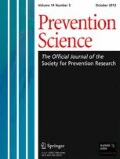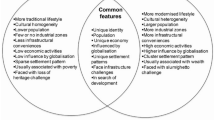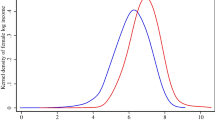Abstract
Evidence of the effectiveness of programs to change gendered social norms related to intimate partner violence (IPV) is growing, but their potential to significantly impact actual occurrence of IPV at population level is lacking. We study whether modest changes in gendered social norms related to wife-beating can result in significant changes in the incidence of emotional, physical, and sexual IPV among ever married women in Uganda. We employ an imputation-based causal inference approach, based on nationally representative Demographic Health Survey data. The steps are (1) model the association between adjusted neighborhood norms and experiences of IPV using a random effects logistic regression model, (2) impute unobserved counterfactual probabilities of experiencing IPV for each woman while manipulating her neighborhood norms by setting it to different values, (3) average the probabilities across the population, and (4) bootstrap confidence intervals. Results show that statistically significant inverse associations between more prohibitive neighborhood IPV norms and women’s experiences of different forms of IPV at the population level exist. The effect is however small, that even if an entire community disapproves of wife-beating, incidence of IPV falls by about 10 percentage points to 48.5% (95% CI 46.0%–50.9%) from the observed value of 57.6% (95% CI 55.2%–59.9%). Furthermore, changes in neighborhood social norms are found to have no statistical significant effect on the incidence of sexual violence. In conclusion, changing gendered social norms related to wife-beating will not result in significant reductions in different forms for IPV at the population level.

Similar content being viewed by others
References
Abrahams, N., Jewkes, R., Laubscher, R., & Hoffman, M. (2006). Intimate partner violence: Prevalence and risk factors for men in Cape Town, South Africa. Violence and Victims, 21, 247–264.
Abramsky, T., Devries, K. M., Kiss, L., Nakuti, J., Kyegombe, N., Starmann, E., … Watts, C. (2014). Findings from the SASA! Study: A cluster randomized controlled trial to assess the impact of a community mobilization intervention to prevent violence against women and reduce HIV risk in Kampala, Uganda. BMC Medicine, 12(1). doi https://doi.org/10.1186/s12916-014-0122-5
Ahern, J., Hubbard, A., & Galea, S. (2009). Estimating the effects of potential public health interventions on population disease burden: A step-by-step illustration of causal inference methods. American Journal of Epidemiology, 169, 1140–1147. https://doi.org/10.1093/aje/kwp015.
Biswas, A., Dalal, K., Rahman, F., & Deave, T. (2015). Intimate partner violence during pregnancy and victim’s perception on miscarriage. International Journal of Public Health Research, 3, 58.
Buehner, M. J. (2014). Time and causality: Editorial. Frontiers in Psychology, 5. doi https://doi.org/10.3389/fpsyg.2014.00228
Campbell, J. C. (2002). Health consequences of intimate partner violence. The Lancet, 359, 1331–1336. https://doi.org/10.1016/S0140-6736(02)08336-8.
Chan, K. L. (2015). Association between intimate partner violence and child maltreatment in a representative student sample in Hong Kong. Violence Against Women, 21, 500–515. https://doi.org/10.1177/1077801215569080.
Cools, S., & Kotsadam, A. (2017). Resources and intimate partner violence in Sub-Saharan Africa. World Development, 95, 211–230. https://doi.org/10.1016/j.worlddev.2017.02.027.
Devries, K. M., Mak, J. Y. T., Garcia-Moreno, C., Petzold, M., Child, J. C., Falder, G., … Watts, C. H. (2013). The global prevalence of intimate partner violence against women. Science, 340(6140), 1527–1528. doi https://doi.org/10.1126/science.1240937
Devries, K. M., Knight, L., Child, J. C., Kyegombe, N., Hossain, M., Lees, S., … Naker, D. (2017). Witnessing intimate partner violence and child maltreatment in Ugandan children: A cross-sectional survey. BMJ Open, 7(2), e013583. doi:https://doi.org/10.1136/bmjopen-2016-013583
Ellberg, L., Högberg, U., Lundman, B., Källén, K., Håkansson, S., & Lindh, V. (2008). Maternity care options influence readmission of newborns. Acta Paediatrica, 97, 579–583. https://doi.org/10.1111/j.1651-2227.2008.00714.x.
Gass, J. D., Stein, D. J., Williams, D. R., & Seedat, S. (2011). Gender differences in risk for intimate partner violence among South African adults. Journal of Interpersonal Violence, 26, 2764–2789. https://doi.org/10.1177/0886260510390960.
Greene, M. E., & Levack, A. (2010). Synchronizing gender strategies: A cooperative model for improving reproductive health and transforming gender relations.. (Interagency Gender Working Group (IGWG)) Washington, DC: Population Reference Bureau. Retrieved from http://www.prb.org/igwg_media/synchronizing-gender-strategies.pdf. Accessed 5 Dec 2017.
Groenwold, R. H. H., Nelson, D. B., Nichol, K. L., Hoes, A. W., & Hak, E. (2010). Sensitivity analyses to estimate the potential impact of unmeasured confounding in causal research. International Journal of Epidemiology, 39, 107–117. https://doi.org/10.1093/ije/dyp332.
Gutman, R., & Rubin, D. B. (2013). Robust estimation of causal effects of binary treatments in unconfounded studies with dichotomous outcomes. Statistics in Medicine, 32, 1795–1814. https://doi.org/10.1002/sim.5627.
Heise, L. (2011). What works to prevent partner violence? An evidence overview(Monograph) London School of Hygiene and Tropical Medicine. Retrieved from http://strive.lshtm.ac.uk/resources/what-works-prevent-partner-violence-evidence-overview. Accessed 2 Nov 2017.
Jewkes, R. (2002). Intimate partner violence: Causes and prevention. The Lancet, 359, 1423–1429. https://doi.org/10.1016/S0140-6736(02)08357-5.
Johri, M., Morales, R. E., Boivin, J.-F., Samayoa, B. E., Hoch, J. S., Grazioso, C. F., … Arathoon, E. G. (2011). Increased risk of miscarriage among women experiencing physical or sexual intimate partner violence during pregnancy in Guatemala City, Guatemala: Cross-sectional study. BMC Pregnancy and Childbirth, 11(1). doi:https://doi.org/10.1186/1471-2393-11-49.
Kiely, M., El-Mohandes, A. A. E., El-Khorazaty, M. N., & Gantz, M. G. (2010). An integrated intervention to reduce intimate partner violence in pregnancy: A randomized controlled trial. Obstetrics & Gynecology, 115, 273–283. https://doi.org/10.1097/AOG.0b013e3181cbd482.
Kyegombe, N., Starmann, E., Devries, K. M., Michau, L., Nakuti, J., Musuya, T., et al. (2014). “SASA! is the medicine that treats violence”. Qualitative findings on how a community mobilisation intervention to prevent violence against women created change in Kampala, Uganda. Global Health Action, 7, 25082.
Lanza, S. T., Coffman, D. L., & Xu, S. (2013). Causal inference in latent class analysis. Structural Equation Modeling: A Multidisciplinary Journal, 20, 361–383. https://doi.org/10.1080/10705511.2013.797816.
Linos, N., & Kawachi, I. (2012). Community social norms as social determinants of violence against women. American Journal of Public Health, 102, 199–200. https://doi.org/10.2105/AJPH.2011.300410.
Niolon, P. H., Kearns, M. C., Dills, J., Rambo, K., Irving, S. M., Armstead, T. L., & Gilbert, L. K. (2017). Preventing intimate partner violence across the lifespan: A technical package of programs, policies, and practices. Atlanta, GA: National Center for Injury Prevention and Control, Centers for Disease Control and Prevention.
Pallitto, C. C., Campbell, J. C., & O’Campo, P. (2005). Is intimate partner violence associated with unintended pregnancy? A review of the literature. Trauma, Violence, & Abuse, 6, 217–235. https://doi.org/10.1177/1524838005277441.
R Core Team. (2017). R: A language and environment for statistical computing (Version 3.4.1). Vienna, Austria: R Foundation for Statistical Computing. Retrieved from https://www.R-project.org.
Raising Voices, LSHTM, & CEDOVIP. (2015). Is violence against women preventable? Findings from the SASA! study summarized for general audiences. Kampala. Kampala, Uganda. Retrieved from http://raisingvoices.org/wp-content/uploads/2016/01/SASApopularReport.FINAL_.jan2016.pdf. Accessed 10 Nov 2017.
Reid, R. J., Bonomi, A. E., Rivara, F. P., Anderson, M. L., Fishman, P. A., Carrell, D. S., & Thompson, R. S. (2008). Intimate partner violence among men. American Journal of Preventive Medicine, 34, 478–485. https://doi.org/10.1016/j.amepre.2008.01.029.
Rockhill, B. (2005). Theorizing about causes at the individual level while estimating effects at the population level: Implications for prevention. Epidemiology, 16, 124–129. https://doi.org/10.1097/01.ede.0000147111.46244.41.
Rose, G. (2001). Sick individuals and sick populations. International Journal of Epidemiology, 30, 427–432. https://doi.org/10.1093/ije/30.3.427.
Rothman, K. J., & Greenland, S. (2005). Causation and causal inference in epidemiology. American Journal of Public Health, 95, S144–S150. https://doi.org/10.2105/AJPH.2004.059204.
Shakya, H. B., Hughes, D. A., Stafford, D., Christakis, N. A., Fowler, J. H., & Silverman, J. G. (2016). Intimate partner violence norms cluster within households: An observational social network study in rural Honduras. BMC Public Health, 16(1). doi https://doi.org/10.1186/s12889-016-2893-4.
Sharps, P. W., Laughon, K., & Giangrande, S. K. (2007). Intimate partner violence and the childbearing year: Maternal and infant health consequences. Trauma, Violence, & Abuse, 8, 105–116. https://doi.org/10.1177/1524838007302594.
Siemieniuk, R., Miller, P., Woodman, K., Ko, K., Krentz, H., & Gill, M. (2013). Prevalence, clinical associations, and impact of intimate partner violence among HIV-infected gay and bisexual men: A population-based study: Partner violence among gay/bisexual men. HIV Medicine, 14, 293–302. https://doi.org/10.1111/hiv.12005.
StataCorp LLC (2017). Stata data analysis and statistical Software: Release 15. College Station, TX: StataCorp LP. Retrieved from https://www.stata.com.
Stern, E., Heise, L., & McLean, L. (2017). The doing and undoing of male household decision-making and economic authority in Rwanda and its implications for gender transformative programming. Culture, Health & Sexuality, 1–16. https://doi.org/10.1080/13691058.2017.1404642
Tiwari, A. F. Y., Salili, F., Chan, R. Y. P., Chan, E. K. L., & Tang, D. (2010). Effectiveness of an empowerment intervention in abused Chinese women. Hong Kong Medical Journal, 16, 25–28.
Tsai, A. C. (2013). Intimate partner violence and population mental health: Why poverty and gender inequities matter. PLoS Medicine, 10, e1001440. https://doi.org/10.1371/journal.pmed.1001440.
Tsai, A. C., Tomlinson, M., Comulada, W. S., & Rotheram-Borus, M. J. (2016). Intimate partner violence and depression symptom severity among South African women during pregnancy and postpartum: Population-based prospective cohort study. PLoS Medicine, 13, e1001943. https://doi.org/10.1371/journal.pmed.1001943.
Tsai, A. C., Kakuhikire, B., Perkins, J. M., Vořechovská, D., McDonough, A. Q., Ogburn, E. L., et al. (2017). Measuring personal beliefs and perceived norms about intimate partner violence: Population-based survey experiment in rural Uganda. PLoS Medicine, 14, e1002303. https://doi.org/10.1371/journal.pmed.1002303.
Uganda Bureau of Statistics [UBOS], & ICF International. (2012). Uganda Demographic and Health Survey 2011. Kampala, Uganda: UBOS and ICF International. Retrieved from http://dhsprogram.com/publications/publication-fr264-dhs-final-reports.cfm. Accessed 3 Sept 2017.
Uganda Bureau of Statistics [UBOS], & ICF International. (2017). Uganda Demographic Health Survey 2016: Key Indicators Report. Kampala, Uganda: UBOS, and Rockville, Maryland, USA: UBOS and ICF International. Retrieved from http://dhsprogram.com/publications/publication-PR80-Preliminary-Reports-Key-Indicators-Reports.cfm.
Uganda Bureau of Statistics [UBOS], & Macro International. (2007). Uganda Demographic and Health Survey 2006. Calverton, Maryland, USA: UBOS and Macro International. Retrieved from http://dhsprogram.com/pubs/pdf/FR194/FR194.pdf. Accessed 20 March 2018.
Van Parys, A.-S., Verhamme, A., Temmerman, M., & Verstraelen, H. (2014). Intimate partner violence and pregnancy: A systematic review of interventions. PLoS One, 9, e85084. https://doi.org/10.1371/journal.pone.0085084.
Van Parys, A.-S., Deschepper, E., Roelens, K., Temmerman, M., & Verstraelen, H. (2017). The impact of a referral card-based intervention on intimate partner violence, psychosocial health, help-seeking and safety behaviour during pregnancy and postpartum: A randomized controlled trial. BMC Pregnancy and Childbirth, 17. https://doi.org/10.1186/s12884-017-1519-x.
VanderWeele, T. J. (2008). Ignorability and stability assumptions in neighborhood effects research. Statistics in Medicine, 27, 1934–1943. https://doi.org/10.1002/sim.3139.
Westreich, D., Edwards, J. K., Cole, S. R., Platt, R. W., Mumford, S. L., & Schisterman, E. F. (2015). Imputation approaches for potential outcomes in causal inference. International Journal of Epidemiology, 44, 1731–1737. https://doi.org/10.1093/ije/dyv135.
Widom, C. S., Czaja, S., & Dutton, M. A. (2014). Child abuse and neglect and intimate partner violence victimization and perpetration: A prospective investigation. Child Abuse & Neglect, 38, 650–663. https://doi.org/10.1016/j.chiabu.2013.11.004.
World Health Organisation [WHO] (Ed.). (2013). Global and regional estimates of violence against women: Prevalence and health effects of intimate partner violence and non-partner sexual violence. Geneva: World Health Organization, Department of Reproductive Health and Research.
Acknowledgments
We wish to acknowledge the Ministry of Health of Uganda and Demographic Health Survey program, who granted us access to use the DHS data. Furthermore, we are grateful to the East Africa Social Science Translation Collaborative under the Center of Effective Global Action, University of California, Berkeley (EASST/CEGA), for having awarded the lead author the Fall 2017 EASST/CEGA Impact Evaluation Fellowship, during which manuscript preparation and statistical data analysis were carried out.
Author information
Authors and Affiliations
Corresponding author
Ethics declarations
Conflict of Interest
The authors declare that they have no conflict of interest.
Ethical Approval
This is not applicable in this study. The paper utilized secondary data of the Demographic Health Survey program, and permission to use these publically available data was obtained from http://www.dhsprogram.com before data download and subsequent statistical analysis. As such, no ethical reviews and approvals were required before or during preparation of the present manuscript.
Informed Consent
This is not applicable in this study. This is a simulation-based manuscript based on secondary data of the Demographic Health Survey program. There was no interaction with human subjects during preparation of this manuscript.
Additional information
Publisher’s Note
Springer Nature remains neutral with regard to jurisdictional claims in published maps and institutional affiliations.
Electronic supplementary material
ESM 1
(DOCX 16 kb)
Rights and permissions
About this article
Cite this article
Kadengye, D.T., Iddi, S., Hunter, L. et al. Effectiveness of Potential Interventions to Change Gendered Social Norms on Prevalence of Intimate Partner Violence in Uganda: a Causal Inference Approach. Prev Sci 20, 1043–1053 (2019). https://doi.org/10.1007/s11121-019-01010-8
Published:
Issue Date:
DOI: https://doi.org/10.1007/s11121-019-01010-8




